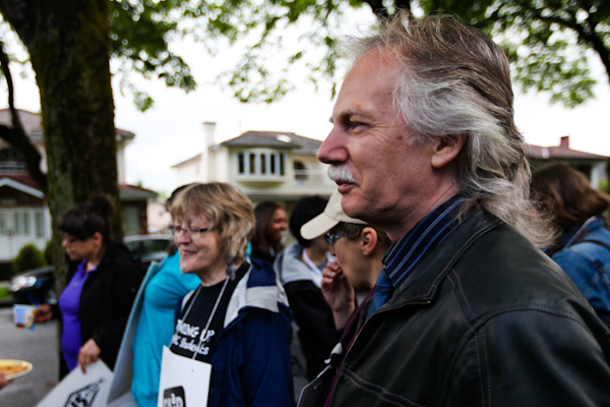B.C. teachers' union President Jim Iker said his bargaining team is ready and willing to get back to the negotiating table, and could have met with the BC Public School Employers' Association today -- if the government had been amenable.
Over the weekend, the union reduced its proposed $225-million fund for teacher class size and composition grievances to $100 million, as opposed to the $75-million annual Learning Improvement Fund the government has promised to use for addressing class size issues, he said in a press conference this afternoon.
This cut follows two salary reductions made by the union in spring, and an increase in contract length to five years from four. The government's biggest move was in June, when it dropped its push for a 10-year deal in favour of a six-year negotiated contract, with an option to extend it to seven years.
In response to Premier Christy Clark's press conference earlier today, where she called on teachers to bring their proposals into the "affordability zone" where other public sector unions signed deals, Iker said the government has to bring money to the table.
"If the government's willing to move in the way that teachers have, we can get this deal done," he said, adding mediator Vince Ready, who walked away from negotiations last week, must also be convinced to return.
"The government needs to show that they're available for full-scale mediation and that they're going to be in a position to move in a way that we moved this past weekend."
Premier misinformed on benefits: Iker
In order to bring education funding up to the level the teachers' union wants, Iker said government must spend $3 more per student, per day. That's significantly less than the $40 a day government has promised parents of children 12 and under to cover childcare costs during the strike. That money, however, is coming from savings the school boards are racking up from not paying teachers while schools are closed.*
Clark also called on teachers to suspend the strike while negotiations continued. But Iker said the government's history of stripping class size and composition language from teacher contracts, then refusing to reinstate it despite two court rulings finding the move unconstitutional, has not inspired trust in the government to negotiate a fair deal without the pressure of a strike.
Teachers are locked out of classes, he added, and so couldn't return even if they wanted to. On Aug. 20, however, the employers' association offered to lift the lockout should teachers return to work.
Although both sides of the table have similar salary proposals -- seven per cent over six years offered by government, and eight per cent over five years requested by teachers -- a $5,000 signing bonus and an updated benefits package are big stumbling blocks.
Clark said this morning that the union is asking for "unlimited massage" benefits, as well as an additional day off for secondary school teachers.
But Iker said the premier is misinformed on benefits, and a previous proposal of $3,000 massage coverage for union members with chronic pain has been dropped to $500 to $700 a year, and a request for an extra preparation day for secondary teachers -- not a day off -- has also been dropped.
He said the $5,000 signing bonus is still on the table, however, because teachers haven't had a salary increase since 2011.
"The signing bonus is negotiable; that's something for us to be dealing with at the table," he said. "But we need a government, also, to be willing to talk about what's fair."
Arbitration still possible
Iker also addressed rumours that teachers wanted to vote on returning to work. Despite the fact their strike pay ran out at the end of June and they haven't been paid since they walked out on June 17, he said the only vote union members want is on a negotiated collective agreement.
Arbitration, where a third party decides on a contract after listening to both sides, has not been ruled out either, he said. A middle ground between the two sides is still possible, but Iker suggested breaking the media blackout that mediator Ready requested both sides stick to isn't the best path to a settlement.
"Maybe we're in the media too much," he said, "because maybe we should be bargaining rather than being out here."
Story corrected Sept. 4 at 10:30 a.m.: This story previously stated administrators and support staff were not being paid during the strike. This is incorrect. ![]()
Read more: Education, BC Politics

















Tyee Commenting Guidelines
Comments that violate guidelines risk being deleted, and violations may result in a temporary or permanent user ban. Maintain the spirit of good conversation to stay in the discussion.
*Please note The Tyee is not a forum for spreading misinformation about COVID-19, denying its existence or minimizing its risk to public health.
Do:
Do not: